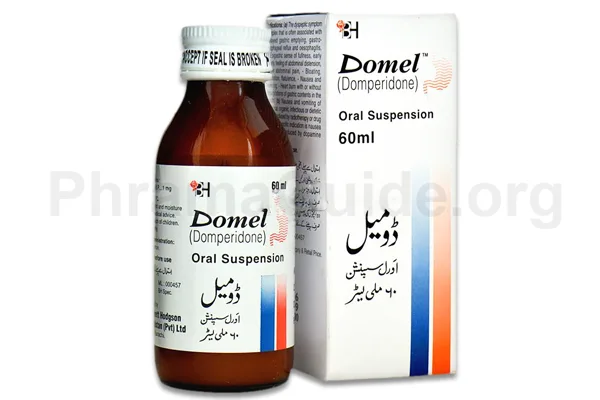Domel syrup is a medication that is primarily used for the treatment of gastrointestinal disorders. It helps to prevent the stomach from contracting and emptying too quickly, which can cause nausea and vomiting. Here is the detailed information about Domel Syrup’s common uses and indications:
- Relief of Nausea and Vomiting: Domel Syrup is commonly used to alleviate symptoms of nausea and vomiting. It works by blocking dopamine receptors in the chemoreceptor trigger zone (CTZ) of the brain, which helps reduce the signals that trigger nausea and vomiting.
- Gastroparesis: Gastroparesis is a condition characterized by delayed emptying of the stomach. Domel Syrup may be used in the treatment of gastroparesis to improve stomach emptying and reduce symptoms such as bloating, nausea, and early satiety.
- Gastroesophageal Reflux Disease (GERD): Domel Syrup is also used in the management of GERD, a condition where the stomach acid flows back into the esophagus, causing heartburn and regurgitation. It helps by promoting the movement of food through the digestive system and reducing the frequency of reflux episodes.
- Dyspepsia: Dyspepsia refers to recurrent or persistent upper abdominal discomfort or pain. Domel Syrup can be used in the treatment of dyspepsia to relieve symptoms such as bloating, fullness, and discomfort.
- Prevention of Nausea and Vomiting Due to Certain Medications: Domel Syrup may be used to prevent or reduce nausea and vomiting caused by certain medications, such as chemotherapy drugs or opioid painkillers.
Off-label Uses of Domel Syrup
- Increasing Milk Production: Domel Syrup has been used off-label to promote lactation in breastfeeding women with low milk supply. It works by increasing the levels of prolactin, a hormone responsible for milk production. However, it is important to discuss this use with a healthcare professional, as the safety and efficacy of Domel Syrup for this purpose are still a topic of debate and may vary depending on the country.
- Irritable Bowel Syndrome (IBS): In some cases, Domel Syrup has been used off-label to manage symptoms of irritable bowel syndrome, such as abdominal pain, bloating, and altered bowel habits. Its effects on motility and nausea may provide relief for some individuals with IBS. However, the evidence supporting its use in this condition is limited, and other treatment options are typically recommended.
- Gastroesophageal Reflux in Infants: Domel Syrup has been used off-label in infants to manage symptoms of gastroesophageal reflux, such as regurgitation and excessive crying. It may help by promoting stomach emptying and reducing reflux episodes. However, the use of Domel Syrup in infants should be carefully considered and prescribed by a pediatrician.

What is Domel?
Domel Syrup is one of the leading brands of Domperidone in liquid form, manufactured and marketed by Barrett Hodgson Pakistan (Pvt) Ltd.
Domel Alternatives : Other Similar Brands
The following are some alternative brands of Domel and their manufacturers.
- Motilium : Janssen Pharmaceutica.
- Peridone : Sami Pharmaceuticals (Pvt) Ltd, Pakistan.
- Vomilux : Atco Laboratories, Pakistan.
- Pelton V : Global Pharmaceuticals (Pvt) Ltd, Pakistan.
- Emiset : Platinum Pharmaceuticals (Pvt) Ltd, Pakistan.
- Domflash : Next Pharma (Pvt) Ltd, Pakistan.
- Stomacol : High Q Pharmaceuticals (Pvt) Ltd, Pakistan.
- Nomit : Le Mendoza Pharmaceuticals (Pvt) Ltd, Pakistan.
- Emidone : Pharmix Laboratories (Pvt) Ltd.
- Millium : English Pharmaceuticals Industries.
Domel : Available Formulations and Strengths
Presently, Domel is available in Syrup and Tablet Forms.
Domel Syrup : 5ml/5ml strength.
Domel Tablet : 10mg strength.
Who Should Not Use Domel?
Domel Syrup has certain contraindications, which are conditions or situations where its use is not recommended due to potential risks or lack of effectiveness.
Hypersensitivity: Domel Syrup should not be used in individuals who have a known hypersensitivity or allergy to the medication or any of its ingredients. Allergic reactions can range from mild skin rashes to severe symptoms such as difficulty breathing or swelling of the face, lips, or tongue.
Prolactinoma: Domel Syrup stimulates the release of prolactin, a hormone that stimulates milk production. It is contraindicated in individuals with a known or suspected prolactinoma, which is a type of pituitary tumor that causes excessive prolactin production. The use of Domel Syrup in these cases may further increase prolactin levels and worsen the condition.
Gastrointestinal Bleeding, Obstruction, or Perforation: Domel Syrup should not be used in individuals with gastrointestinal bleeding, obstruction (partial or complete blockage), or perforation (rupture) as it may worsen these conditions.
Prolonged QT Interval: Domel Syrup can have a potential effect on the heart’s electrical activity and may cause a prolongation of the QT interval on an electrocardiogram (ECG). It is contraindicated in individuals with known or suspected QT interval prolongation or other significant heart rhythm abnormalities.
Severe Liver Disease: Domel Syrup is metabolized in the liver, and its clearance may be reduced in individuals with severe liver dysfunction. It is contraindicated in individuals with pre-existing liver disease or significant liver impairment.
Concomitant Use with Certain Medications: Domel Syrup should not be used concomitantly with certain medications that may interact with it, such as certain antifungal medications, certain antibiotics, and certain antidepressants. These medications can inhibit the metabolism of Domel Syrup and increase its blood levels, leading to an increased risk of adverse effects.
What is the Recommended Daily Dosage of Domel?
Domel should take before meals because when taken after meals, its absorption is slightly delayed.
Domel Syrup Dose:
- 10ml (2 teaspoons) 3-4 times in 24 hours.
- The maximum Dose is 40mg (40ml of Domel Syrup) in 24 hours.
How Domel Works?
Domel Syrup blocks dopamine receptors in the chemoreceptor trigger zone (CTZ) of the brain and in the GI tract. By doing so, it inhibits the inhibitory effects of dopamine on the GI tract, resulting in increased motility and enhanced coordination of gastric contractions.

Leave A Comment